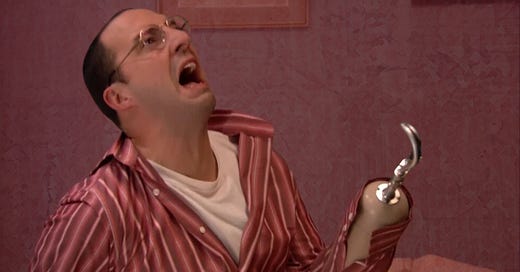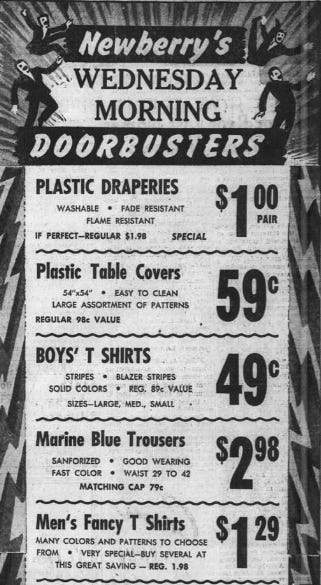The linguistic tyranny of the 'doorbuster'
Let's end this stupid, made-up word's reign of terror. Read to the end for quick takes on the Gamecocks, The Penguin, and Mrs. Davis.
For a few peaceful years, I managed to elude the grasp of TV advertising. But ever since the big streamers broke the agreement we entered into when we helped them cannibalize cable TV, I’m once more forced to learn about the complicated personal backstories of fictional car insurance spokespeople and spokesanimals, among other indignities. And since it’s late November at the time of this writing, ‘tis the season for non-stop ads about something called “doorbusters.”
I hate this word, doorbusters, and I will not rest until all memory of it has been wiped from the historical record.
When I confide in people the depths of my hatred for the word, I’m met with looks of puzzlement. And I acknowledge that my loathing is, to some extent, a matter of personal taste: the way the r sound bleeds into the b sound is off-putting. And there’s just something irritatingly juvenile about the word “buster.”
And then there’s audacity of making it a compound; as if our society is so wholly given over to the act of busting doors that it’s high time we eschewed the formality of keeping the two nouns separate. Placing doorbuster along side “rainbow, “toothbrush,” and “popcorn” is linguistic gaslighting and nothing less than compound-word stolen valor.
But if doorbuster was just my personal “moist,” I would peaceably resign myself to being annoyed by the sound of it and leave it there. As it is, however, there’s something much more sinister lurking beneath the surface.
“Door buster” first appeared in print in 1949, in a Tuscaloosa News advertisement for JCPenney. A year later, Newberry’s compounded the word — along with our suffering — in the pages of the Los Angeles Times. For a few decades, doorbuster existed as a condescending and manipulative — but mostly anodyne, in relative terms — invention of the advertising industry.
Check it out, you rubes and lackwits! Here’s a thing you should want so badly that, in your enthusiasm to part with your money, you’ll be powerless to stop yourself from committing vandalism.
Though it definitely sucks, ad executives have inflicted far greater ills on our collective psyche. But the word “doorbuster” acquired decidedly more grim connotations in the second half of the 20th century, when Black Friday doorbusters turned lethal.
There are too many horrifying incidents list them all, but here’s one from the recent past:
It was 5 a.m. the morning after Thanksgiving in 2008. Outside a Walmart in Valley Stream, NY, more than 2,000 shoppers braved the freezing cold for hours, waiting for the doors to open and the holiday sales to begin. The second the doors were unlocked, chaos ensued. The glass shattered, and the crowd surged forward, trampling 34-year-old Jdimytai Damour to death in their desperation for deals. Even after the tragedy was announced, some shoppers simply continued hunting for bargains, unwilling to let anything interrupt their Black Friday quest.
In a better world, Black Friday violence might have led advertisers to rethink their word choices as early as 1983, when discounted Cabbage Patch Kids turned us into feral, post-fallout scavengers: we injured a pregnant woman, broke another woman’s leg, and left a Zayre’s store manager to fight of the rabid hordes with a baseball bat.
But the doorbuster endures as an advertising gimmick, even amid the awareness that doorbusters — and the lawless mayhem they promote — produce casualties almost every year. Since 2006, the website Black Friday Death Count calculates that there have been 17 deaths and 125 injuries at shopping malls. And this is in an era when online shopping has significantly eaten into in-store demand.
So when a company uses the word “doorbuster,” they are summoning us to the arena, like gladiators for capitalism. Like ritual sacrifices to the fickle gods of profit. They are intentionally conjuring memories of pointless death and maiming in order to move product.
Check it out, you rubes and lackwits! Here’s a thing you should want so badly that, in your enthusiasm to part with your money, you’ll be powerless to stop yourself from committing manslaughter.
Some things that did not make me angry this week
Them Gamecocks. Beating Clemson in the era of Clemson having consistent national title expectations is always extremely funny. It’s even funnier when we win despite probably having been the worse of the two teams. Funnier still when we basically just have one guy who’s too good for anyone to stop even though it’s extremely obvious what he’s going to do. And since we almost never have a guy like that, watching LaNorris Sellers steamroll Clemson kicked serious ass.
After the game, Shane Beamer proclaimed that Sellers is the best player in the country. And while Sellers has made way too many mistakes this year for that to be a serious argument, it definitely feels like something that could be true by the end of next season. And that’s fun to think about!
“Mrs. Davis” on Peacock. Every now and again an actor comes along whose career I get disproportionately invested in. Oh my god, they’re so good. Shouldn’t they be in more things? Why aren’t they in more things? Is there still enough time for them to become a star? Sometime around 2020’s The Hunt, Betty Gilpin became one of those actors.
“Mrs. Davis” is perhaps the weirdest show I have ever watched, and there is no way to describe the plot that won’t make me sound insane. The best I can do is show you a scene that I can’t stop thinking about: Betty Gilpin being overcome with exasperation at her ex-boyfriend’s determination to win a contest to see who can go the longest without letting go of a giant sword — a side quest that derails their main objective of finding and destroying the Holy Grail.
“The Penguin” on HBO.1 When was the last time a piece of big-budget superhero entertainment had something to say about the world it was being released into? Iron Man (2008) directly confronted the War on Terror, but since then … what? “The Penguin” was excellent from start to finish and really clarified for me what has been missing from Marvel, post-Infinity War. I have more to say about this show, but I’m going to save that for a later date.
Sea of Tranquility by Emily St. John Mandel. I’ve owned this book since it came out but hadn’t got around to it until last month, when I got stranded at an indoor soccer field for six hours. I ripped through it in one sitting and was vindicated in my belief that you should always bring a book, even if it seems highly unlikely that there will be time to read a book. It’s even better than Station Eleven, and is in conversation with the reaction to that novel in ways that I found charming.
No, I haven’t forgotten about the Jim Carlen thing. Just felt a dire need to get this doorbuster rage off my chest.
Until next time.
Yes, I know HBO is Max now. No, I will not ever call it that.






Sea of Tranquility is transcendent
Great read. Yes HBO will always be HBO. To call it Max seems like it should be Cinemax, if they insist on that we should be able to see some of those cheesy soft core late night movies.